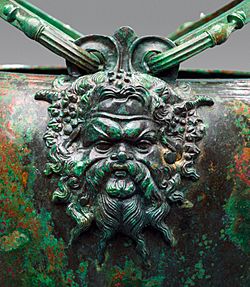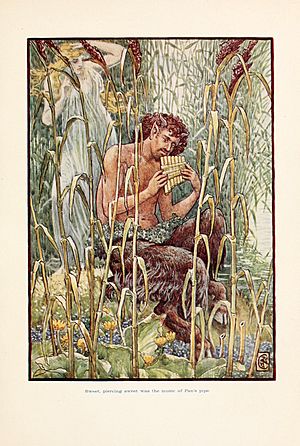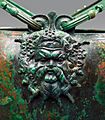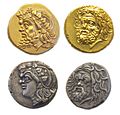Pan (god) facts for kids
Quick facts for kids Pan |
|
|---|---|
| God of nature, the wild, shepherds, flocks and of mountain wilds | |

|
|
| Abode | Arcadia |
| Symbol | Pan flute, goat |
| Personal information | |
| Consort | Syrinx, Echo, Pitys |
| Children | Silenos, Iynx, Krotos, Xanthus (out of Twelve) |
| Parents | many variations including: Hermes and Driope, Aphrodite, or Penelope |
| Siblings | Satyrs, Laertes, Circe, Maenads |
| Roman equivalent | Faunus |
Pan was an important god in ancient Greece. He was known as the god of nature, wild places, shepherds, and their flocks. He also loved rustic music. In Rome, people called him Faunus.
Pan looked very unique. He had the legs and horns of a goat, but the body of a human. This made him look like a satyr, which is a mythical creature.
Pan was also famous for making a very loud, scary sound. This sound was so powerful it could cause extreme fear in anyone who heard it. This is actually where the English word "panic" comes from! As the lord of the wild, many forest creatures, like satyrs and nymphs, listened to him.
There's a famous story that Pan died. A sailor once heard a voice near an island saying, "Tell them the great lord Pan is dead." The sailor shared this news, and many people believed it. However, some still think Pan lives on today. They believe he slowly fades away as the wild parts of the world are destroyed.
Contents
Pan's Family
Pan's parents are often said to be Hermes, the messenger god, and a daughter of Dryops. Some old stories also say that Pan's mother was Penelope, who was the wife of Odysseus.
Pan in Mythology

Pan was very proud of his music, which he played on his special pipes (a Pan flute). One day, he was brave enough to challenge Apollo, the god of music and the lyre, to a music contest.
Tmolus, a mountain god, was chosen to be the judge. Pan played his pipes, and his rustic (country-style) melody pleased him and his loyal friend, Midas, who was watching.
Then, Apollo played his lyre. His music was beautiful. Tmolus quickly decided that Apollo was the winner. Everyone agreed, except for Midas. Midas thought Pan should have won and questioned the judge's decision. Apollo was not happy with Midas's bad ears. So, he turned Midas's ears into those of a donkey!
How Pan Was Worshipped
The worship of Pan first started in Arcadia, a mountain area in Greece. Hunters from Arcadia would sometimes hit a statue of Pan if they had a bad day hunting. This was their way of showing their disappointment to the god.
Pan was usually not worshipped in big temples. Instead, people honored him in natural places like caves or grottoes (small caves). A famous place was the Cave of Pan on the north side of the Acropolis of Athens. There are only a few exceptions, like the Temple of Pan by the Neda River and another in ancient Egypt. Pan was also shown on coins from a city called Pantikapaion in the 4th century BC.
Interesting Facts About Pan
- Pan might be older than the famous Olympian gods. The ancient writer Herodotus said that, according to Egyptian history, Pan was one of the oldest gods.
- He is said to have given the goddess Artemis her hunting dogs. He also taught Apollo the secret of prophecy, which is the ability to see the future.
- Sometimes, Pan was not just one god, but many! In an old story called Dionysiaca, the god Pan had twelve sons. These sons helped the god Dionysus in a war against the Indians.
- In the English town of Painswick, people once had an annual parade for Pan in the 1700s. They would carry a statue of him and shout "Highgates! Highgates!" This tradition stopped in the 1830s but was brought back for a short time later.
Images for kids
-
Pan, painted by Mikhail Vrubel in 1899.
-
Pan depicted on the cover of The Wind in the Willows
-
Francisco Goya, Witches' Sabbath (El aquelarre), of Basque mythology. 1798. Oil on canvas, 44 × 31 cm. Museo Lázaro Galdiano, Madrid.
See also
 In Spanish: Pan (mitología) para niños
In Spanish: Pan (mitología) para niños
 | Kyle Baker |
 | Joseph Yoakum |
 | Laura Wheeler Waring |
 | Henry Ossawa Tanner |







